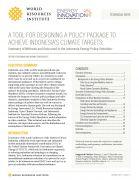A Tool for Designing a Policy Package to Achieve Indonesia’s Climate Targets
Summary of Methods and Data used in the Indonesia Energy Policy Simulator

Synopsis
Indonesia, one of the world’s major greenhouse gas emitters, has outlined a plan to unconditionally reduce its emissions by 29 percent relative to a business-as-usual case in 2030 and up to 41 percent conditioned on international assistance. Policymakers need to design supporting policy packages to meet these climate targets while at the same time meeting the demands of the nation’s increasing population. Indonesia’s Energy Policy Simulator (EPS), a System Dynamics computer model, can estimate the impacts of various policy packages and offer objective, quantitative analysis to help Indonesia develop smart packages of policies that can work in concert to deliver Indonesia’s climate goals. The tool was developed by Energy Innovation LLC, World Resources Institute Indonesia, Open Climate Network, and the Indonesia’s Institute for Essential Services Reform, following the success of the Energy Policy Simulator’s model adaptation in other countries. This technical note describes the structure, the input data sources, and the limitations and assumptions of Indonesia’s EPS.
Projects

Open Climate Network Indonesia, Climate Policy Options
Visit ProjectExploring different policy options for Indonesia to meet and/or beat its INDC while taking into account its development priorities
Part of Climate